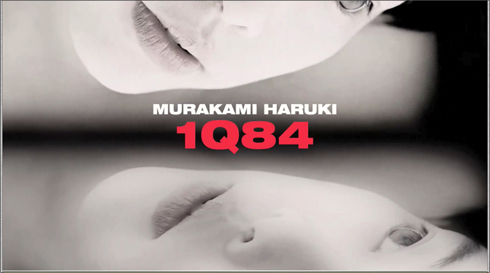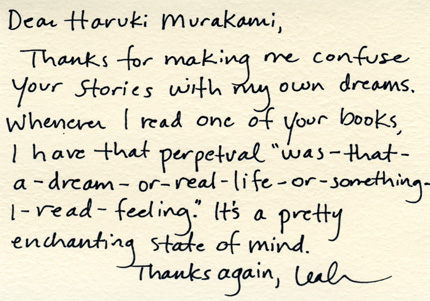

From an Italian interview (I’m trying to translate):
By gathering facts that aren’t real it is possible to build a world that appears more realistic than the one we live in. In other words, it is possible to make a fictional world that shows us reality in a more authentic way. This is what, one of the things, I want to do in my work.
Q. As if one world wouldn’t be enough to explain human condition, let’s call it X. As if everything, literature, life, love, death, X was the result of the continuous interaction between A and non-A. Is that so?
A. I believe that one of the duties of a writer is to rouse that domain of the spirit that isn’t being used in everyday life. To achieve this one needs to turn “On” some switches on the control panel of consciousness. If you succeed, those latent, dormant domains can slowly reawaken. Novels – the good ones – have that potential. And if all works well, through that secret passage that was revealed, we can set foot in a world that we aren’t used to see. My books show the path to reach that internal landscape, a path as a metaphor, to provoke a reaction. Therefore, structurally, what is narrated within the story becomes its function.
I’m so glad I discovered Haruki Murakami. The two books I ordered arrived earlier today. 1Q84 is a lush hardcover edition. I ran a wordcount on it and it’s 425k, just slightly bigger than A Storm of Sword. A big book. I also noticed a subtle touch: the right pages seemed to have the writing “shifted” down by one line, and I figured out it was deliberate, as it’s based on the theme of the “mirror”, with one half being specular to the other.
The other book I got is “The Wind-up Bird Chronicle”, but in the Italian edition since I knew the English one was arbitrarily cut. I spent some time comparing this edition with the English one and found out four chapters or so were cut, but, being the chapters rather short and the pagecount keeping a similar “ratio”, my guess is that not more than 10-15% was cut overall. Which doesn’t make sense, why 600 pages are just fine, but 660 so much that they needed to be cut?
From the few pages I’ve read it seems the kind of stuff I love. The writings flows superbly and is a pleasure to read. These days I was explaining why I didn’t like “The Shadow of the Wind” by Carlos Ruiz Zafón, and what is interesting is that Murakami seems to share a similar “magic realism”. Yet the point is that (for me) in one case it works and in the other it doesn’t. A matter of “how”, and not “what”. (and Steven Erikson’s “This River Awakens” too can be put in this context)
A couple of quotes from 1Q84 that caught my attention:
No, of course, not in itself enough. There also has to be that ‘special something’, an indefinable quality, something I can’t quite put my finger on. That’s the part of fiction I value more highly than anything else. Stuff I understand perfectly doesn’t interest me.
And:
It was probably Chekhov who said that the novelist is not someone who answers questions but someone who asks them.
1Q84 seems to have this “meta” layer, with the character(s?) in the novel being a novelist, discussing other writers and their works. With lots of stuff being pertinent to Murakami, becoming self-referential, in a loop.
So you have these two levels. The one where you are a reader reading and trying to understand the book, and the one (in the book) where the characters also read and try to discuss/understand in superb metalinguistic, recursive, self-aware style. (and in this context I can mention this, also in relation to “Gödel, Escher, Bach”)
I love this stuff.

